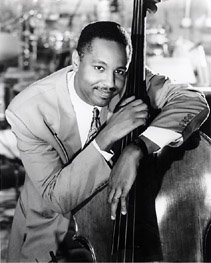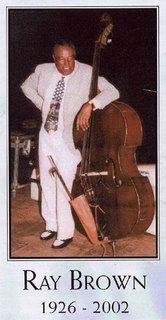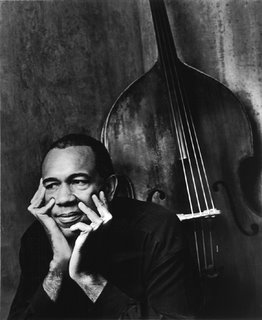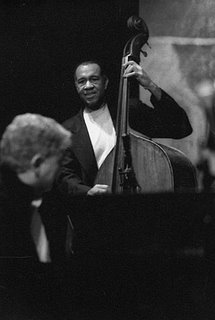 I meant to post something here a few weeks ago, closer to the actual anniversary. Better late than never though.
I meant to post something here a few weeks ago, closer to the actual anniversary. Better late than never though.First a little background though:
From WIKIPedia: Ray Brown was born in Pittsburgh, and had piano lessons from the age of eight. After noticing how many pianists attended his high school, he thought of taking up the trombone, but was unable to afford one. With a vacancy in the high school jazz orchestra, he took up the double bass.
But that's not the entire story. For DECADES Ray was regarded in the Jazz world as the finest bass player there is/was. He is the touchstone for bass players today, young and old, professional and novice alike. He has been the first call bass player around the world for a long time. If you could get Ray Brown to play with you, well, you are obviously "somebody".
Then the world was shocked by the news of Ray’s
 untimely death on Tuesday July 2nd in Indianapolis, Indiana, where he passed away during a nap after a golf game. He had been resting up for his evening performance at the Indianapolis Jazz Kitchen.
untimely death on Tuesday July 2nd in Indianapolis, Indiana, where he passed away during a nap after a golf game. He had been resting up for his evening performance at the Indianapolis Jazz Kitchen. Through his career, he mentored several young bass players, who take up the mantle of his leadership in the bass world. Two of those, John Clayton, and Christain McBride were among them. They played with Ray Brown through the last several years and recorded a series of CDs called "SuperBass". A trio of exemplary bass players, and in fact John Clayton is certainly among my favorite musicians. He comes to Salt Lake once a year to play in this venue or that, and I have had a personal email correspondence with him for going on two or three years now.
When Clayton was studying classical bass at UCLA many years ago, he heard Ray Brown teaching across the hall, and, he reports, that was the last classical lesson he took. He became a student of the Master. Note here though, that John Clayton is also a preeminent classical player as well. At every one of his shows, he plays a solo in the classical genre, and it is readily evident to all in attendance that he is truly a master of the instrument. He remained close to Brown through the decades.
Through his entire career, Brown never once thought that he was bigger than Jazz, and he always took the time to teach and mentor younger players. I remember a story I once heard about him: a younger player once spoke to Ray and asked him how he had done a particular passage in a recording. The younger player noted, "how did you DO that? I can't even make my fingers THINK about that?"
Brown looked at him and asked him how old he was. The younger player repsonded, and Brown then said, "When you've been doing this for forty or fifty years, come see me, and if you STILL can't figure it out, I'll show you."
That has stuck with me for a long time now, and I expect it to stay with me for a long time to come. He was a teacher, publishing many bass method books and taking the time to be an instructor in various settings throughout his career. His answers never included any shortcuts. It's about practice.
 A few weeks ago, I was looking around the web and noticed a place called "Inner Game of Music." While I won't go into a lot of depth here, I will note that if you are a musician of any level, you might want to check that place out. There is also a Ray Brown Tribute there that is worth reading, if you have interests that incline toward this area. John Clayton was a pall-bearer and also spoke at the service. One quick quote from that site:
A few weeks ago, I was looking around the web and noticed a place called "Inner Game of Music." While I won't go into a lot of depth here, I will note that if you are a musician of any level, you might want to check that place out. There is also a Ray Brown Tribute there that is worth reading, if you have interests that incline toward this area. John Clayton was a pall-bearer and also spoke at the service. One quick quote from that site:"It is easy to dismiss Ray as a gifted artist who was just ‘born to play the bass.’ But those close to Ray knew that his incredible professional success was not just based on talent but on hard work. Ray’s lifetime protégée is John Clayton. John was like Ray’s ‘son’ as a young boy and as a young bassist.
John recalled Ray saying: “People think this stuff comes easy to me … well that’s bullshit, I PRACTICE!” And he did. John witnessed Ray’s technical and musical growth until he died. Ray would ask John things about the bow. “Show me that thing you did with the bow.” John would look with his mouth open and say “What are you talking about? You’re Ray Brown!” Ray would get upset with John and say “Dammit, we can all learn something from each other … show me how you do that!” And Ray would not only take it in, he would practice it.
John recalled some older recordings of Ray’s early bowed solos with Oscar Peterson, it was pretty embarrassing. But if you listen to his work with the bow in the last 10 years, you will notice a remarkable improvement. He got everything he could from everyone, including taking some lessons with the legendary French bass virtuoso François Rabbath. He was a life-long learner. Ray would be brutally honest when young aspiring bassists would ask him for his secrets to success or how he mastered his technique. The answer never included short cuts—it was all about hard work and integrity. This was Ray’s way.
The highlight of Brown's memorial service was a moving tribute to all the lessons John Clayton received from Ray Brown. John said:
 Today is a celebration of this man we loved, the man that gave us such big, fat, rich, warm, juicy, chocolate, delicious, gorgeous brown bass notes. And, of course, he gave us much more. He reached inside himself and gave whatever he had to give from his soul.I had starry eyes when I was a teenager studying with Ray. I would follow him around to recording sessions and see people like Bill Cosby, Quincy Jones, Sweets Edison…. I wanted to be just like Ray when I grew up. So I asked him at a session: "When I’m done with college, do you think you can help me do this sort of thing, become a studio musician?" I got 'The Look' times ten, and curse words I never knew existed. "Are you out of your F-in’ mind? You wanna play this horse manure?" And then he went into his little girlie high-pitched voice and said: "You can’t even play the bass and you want to waste your time playing whole notes and kissing ass all day?! You need to learn how to play the bass from the top to the bottom. Then you need to get out and play some music. Then when you’re done, if you want to play this garbage it’ll be here.
Today is a celebration of this man we loved, the man that gave us such big, fat, rich, warm, juicy, chocolate, delicious, gorgeous brown bass notes. And, of course, he gave us much more. He reached inside himself and gave whatever he had to give from his soul.I had starry eyes when I was a teenager studying with Ray. I would follow him around to recording sessions and see people like Bill Cosby, Quincy Jones, Sweets Edison…. I wanted to be just like Ray when I grew up. So I asked him at a session: "When I’m done with college, do you think you can help me do this sort of thing, become a studio musician?" I got 'The Look' times ten, and curse words I never knew existed. "Are you out of your F-in’ mind? You wanna play this horse manure?" And then he went into his little girlie high-pitched voice and said: "You can’t even play the bass and you want to waste your time playing whole notes and kissing ass all day?! You need to learn how to play the bass from the top to the bottom. Then you need to get out and play some music. Then when you’re done, if you want to play this garbage it’ll be here.
One of his pet peeves was when he would spill his guts, play from his heart, and the audience would sit on their hands. It was as if they were not hip enough to applaud. He couldn’t stand that! I say, ladies and gentlemen, that we take a moment out to show our appreciation to Ray. He has played his last bass solo for us—it was a lifetime of a bass solo and we all listened in and grooved along with it.
So now, as Ray would want us to do, so that he can look down and take a bow, let us applaud his solo and the love and life that he gave us. Let us stand and applaud like we’ve never applauded before. Let us applaud so that Dizzy and Bird and Milt and Monk and Trane will raise their eyebrows in amazement. Let us applaud because we love him as much as he loved us. Ladies and gentlemen, the maestro, the baddest, let’s hear it for Ray Brown. The roar of the chapel could likely be heard for miles."
Here, here.
May we all "play our own music" from the heart. Whatever that may be.
No comments:
Post a Comment